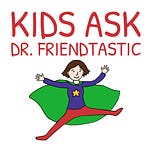I love how kids ask simple questions that have deep answers. We all know friends are important, but Brayden wants to know why. In this week’s episode, I spell out some research findings about the importance of friends and also some ideas about how to be a good friend.
My family is going through a very stressful time right now, due to a medical crisis. Practical and emotional support of my friends and family has sustained me during this difficult time. How have friends played an important role in your life?
Scroll down for podcast TRANSCRIPT, DISCUSSION QUESTIONS, and how to submit YOUR CHILD’S QUESTION. You can always listen to podcast episodes right here in your email, where you’ll also receive transcripts and discussion questions, but please also subscribe and leave a review for Kids Ask Dr. Friendtastic on your favorite podcast app!
Would YOUR kid enjoy being featured on the podcast?
Adults, please use your smartphone's memo function or an audio app to record your child's question. Hold the phone close to your child's mouth to make sure the recording is clear. Have your child state:
their FIRST NAME (or another first name),
their AGE, and
a BRIEF QUESTION or concern about friendship. (Please do not include any friends' names.)
Submit the audio file at https://DrFriendtastic.com/submit. I’ll answer as many questions as I can. (Obviously, this is not psychotherapy, and it’s not for emergency situations.)
Think About It Questions to discuss with your child
Why do you think having good friends makes it easier for kids to cope with stress? How has a friend been kind or helpful to you when you’ve had to deal with difficult situations?
How can too much conflict hurt a friendship?
Why do you think kids sometimes stick with a low-quality friendship (where there’s a lot of conflict and not much fun or closeness)?
What are some examples of things you’ve done to support or care for a friend?
Think of a time you had a friendship rough spot. How did you handle it?
Dr. Friendtastic says that learning to be a good friend “is a step toward peace and justice in the world.” Do you agree? Why or why not?
Transcript
Hi, there! I’m Dr. Eileen Kennedy-Moore, also known as Dr. Friendtastic. I’m an author and clinical psychologist based in Princeton, NJ.
Here’s today’s question:
Hello, my name is Brayden. I am nine years old. My question today is, why is friendship important?
Hi, Brayden. Thank you for asking this question! In my psychology practice, through my books for parents and kids, and on this podcast, I spend a lot of time helping kids learn to build strong and caring friendships because I believe friendships are very important. So, thanks for giving me the chance to spell out why friendships matter so much.
Friends make the good times more fun and the hard times easier to bear.
Scientists have found that when kids have even one friend they like who likes them back, they feel happier and more confident, they cope better with stress, they’re more engaged in school, and they’re less likely to be bullied.
Friends can also help kids learn to become better, kinder people. Caring about a friend, or just wanting to continue playing with a friend, encourages kids to step beyond thinking only about what they want and consider someone else’s feelings.
But not all friendships are created equal! Researchers also talk about “friendship quality.” In low-quality friendships, there’s a lot of conflict and not much fun or closeness. They also might lead you to get in trouble or do things that you know aren’t right, like cheating or being mean to someone.
In high-quality friendships, kids have fun together, and they also trust each other with their private thoughts and feelings. They help and support each other, and they’re loyal and stick up for each other.
So, how do you know if you have good, high-quality friendships? Pay attention to how you feel when you’re with your friends. Good friendships feel good most of the time and bring out the best in you. Pay attention, also, to what you can give as a friend, not just what you get. What are you doing to support and care for your friends?
Even good friends sometimes have disagreements, mistakes, and misunderstandings. Figuring out how to work through those unavoidable friendship rough spots helps us become wiser and kinder. Trying to be a good friend can inspire us to talk and explain rather than yell, to listen and compromise rather than demand, to apologize and forgive rather than acuse. None of this is easy, but all of it can help our friendships grow even stronger.
There are a lot of problems in the world right now. To solve most of them, we need to be able to look at each other with kind eyes and treat each other with caring and respect. When you learn how to be a good friend, that’s a step toward peace and justice in the world. And that’s the most important thing of all.
This has been Kids Ask Dr. Friendtastic. If you have a question about making and keeping friends that you’d like me to answer, go to DrFriendtastic.com, and click on the podcast tab to see how to submit your question.
Do you want to learn even more about friendship? Check out my funny and practical books for kids: Growing Friendships: A Kids’ Guide to Making and Keeping Friends, and my new book, Growing Feelings: A Kids’ Guide to Dealing with Emotions About Friends and Other Kids. They’re available through your library or wherever you buy books.
The Dr. Friendtastic newsletter and the Kids Ask Dr. Friendtastic podcast are for educational purposes only. They may or may not be relevant for your particular situation. I trust you to use your judgment about what’s right for your child and your family.













Share this post